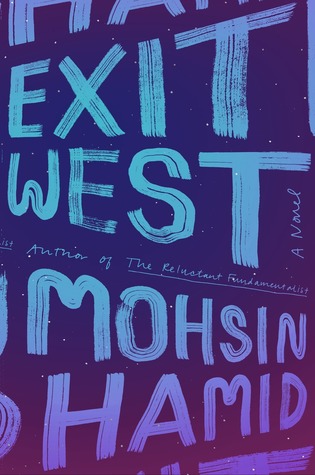Exit West
by Mohsin Hamid
Stripped down to its most basic core you might call Exit West a relationship story. The central plot revolves around a young man and young woman in a poor country. What makes the novel so enticing is everything else happening around them throughout the novel.
You have to call Exit West a refugee story as well. As the young man and young woman start a new relationship their country is starting to be ravaged by war. So as many young people do in times of unrest where they live, where opportunities are limited and the risk of death so high, the young couple leaves for an unknown place that might improve upon their situation.
Where they go and what they find is what made this novel thought-provoking. It felt like living the news headlines in person, which Hamid cleverly touches on in a scene where the young woman sees an article about the refugee crisis with a picture she is startled to recognize as herself. If you have read about Greece and the European refugee migration then you will likely feel much of that same familiarity with the events which unfold. Yet reading them from the perspective of the refugee will bring a new understanding of what those articles really mean to real people stuck in difficult circumstances.
Exit West is the March selection for the NPR/NYT Now Read This book club and in the discussion about this novel one reader brought up an element that I found helpful to understand before diving into the story. Have you read Colson Whitehead's Underground Railroad? A device was used in depicting the journey slaves take when traveling on the Underground Railroad by imaging that journey to be on an actual railroad. For me personally, it is helpful to be aware of that fact prior to starting the novel or else I'm likely to get hung up on that one very non-historical detail making it difficult to appreciate the rest of the work.
For Exit West the plot device used is a series of magic doors that appear all across the globe connecting cities together. They are used as a kind of shortcut for Hamid to describe the migration of refugees from one place to another. In one sense, this seems to mirror how the reader is most likely to have experienced refugees. We know where they come from and where they have ended up, but the in between part is a lost time to most of us, known only by the refugee themselves. Hamid briefly describes that whole timeframe from their point of view with one quick reference. "It was said those days that the passage was both like dying and like being born".
Using the doors also helps us as the reader focus in on the most important part of the story, which is what happens once the refugees arrive. And as a symbol for globalization, the doors are very effective in suggesting how so many different people from so many different countries end up in cities across the world. We watch as the young couple navigates these new places filled with people who are similar to them and also people who are completely different. As they try to decide where they belong it is pointed out that "The only divisions that mattered now were between those who sought the right of passage and those who would deny them passage."
I'm a huge fan of building empathy through books and this is another excellent example of how to accomplish that goal. This novel seeks to immerse you in the world of a refugee so you can understand the uncertainty they feel and find acceptance of their presence. Because we are all connected now in a globalized world where we share problems across borders and refusing to accept a share of the burden won't be sustainable for long. Hopefully novels such at Exit West will make a difference and show us a better way forward.

Comments
Post a Comment